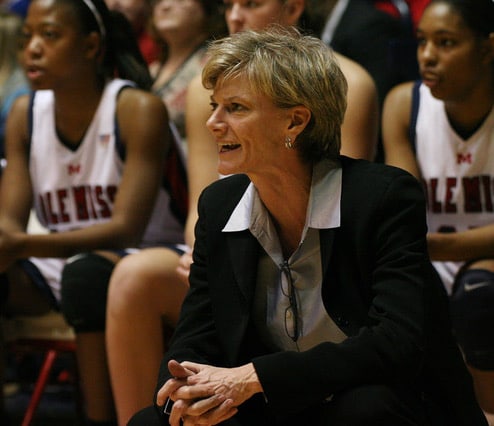Mississippi Today
Mississippi Sports Hall of Fame will induct eight new members Saturday

The Mississippi Sports Hall of Fame will induct eight new members in ceremonies Saturday night at the Jackson Convention Center. The MSHOF Class of 2023 is a diverse one, which, as usual, includes high achieving athletes and coaches.
Below, the eight inductees are profiled, in alphabetical order.

Jeff Herrod, football
Full name: Jeff Sylvester Herrod
Age: 57
Birthplace: Birmingham
College: Ole Miss (1984-87), All-SEC linebacker 1986-87, Ole Miss Team of the Century. Leading tackler in Ole Miss history.
Professional: 11 years in NFL, 10 with Indianapolis Colts. Led Colts in tackles for seven seasons.
Did you know: Herrod was lightly recruited out of high school and Ole Miss was his only Division I offer. He planned to enlist in the U.S. Marines until receiving a late scholarship offer from Ole Miss coach Billy Brewer. He was inducted into the Alabama Sports Hall of Fame in 2017.
Crowning achievement: Herrod, with 528 tackles in his Ole Miss career, is the second leading tackler in Southeastern Conference history behind Tennessee’s Andy Spiva.

Paul Maholm, baseball
Full name: Paul Gurner Maholm
Age: 43
Birthplace: Greenwood (grew up in Holly Springs)
Lives: Hattiesburg
College: Mississippi State (2001-03). A left-handed pitcher, Maholm is one of the most accomplished pitchers in Diamond Dog history with a 27-10 record and 273 strikeouts in 312 innings. Made 46 appearances, 44 starts. Was a freshman All American and All SEC as a sophomore and junior.
Professional: Maholm was the eighth overall pick of the 2003 MLB Draft. Drafted by the Pittsburgh Pirates, Maholm remains the third highest draft pick in MSU baseball history. Played for four Major League teams (Pirates, Cubs, Braves and Dodgers) over 10 seasons at baseball’s highest level, earning $27 million over that period.
Did you know? Maholm declined a signing bonus from the Minnesota Twins to attend Mississippi State, then signed a $2.2 million bonus after three years as a Bulldog. An avid golfer, Maholm is formerly the part owner of the Hattiesburg Country Club and competes at the amateur level.
Crowning achievement: The ace of State’s staff for all three of his Bulldog seasons, Maholm was inducted into the Ron Polk Ring of Honor in 2021.

John Mangum, football
Full name: John Wayne Mangum Jr.
Age: 56
Birthplace: Jackson (grew up in Magee)
Lives: Flowood
College: Alabama (1986-89). Hard-hitting defensive back recruited to Alabama after being named Mississippi’s high school player of the year at Magee. Recruited by Mississippi Sports Hall of Famer Ray Perkins. Mangum holds the Crimson Tide career record for passes broken up. His 16 career pass interceptions rank second in Alabama history.
Professional: Drafted in the sixth round by the Chicago Bears, Mangum played nine seasons in the Windy City, totaling 306 career tackles, 4.5 sacks and five interceptions.
Did you know: Mangum is part of one of Mississippi’s most athletic families. His father, John Wayne Mangum Sr., was a standout defensive tackle for some of the bet defenses in Southern Miss history and then played for the Boston Patriots in the American Football League. His younger brother Kris was an outstanding tight end at Ole Miss and in the NFL. His son, Jake, is one of the all-time baseball heroes at Mississippi State and currently plays for at the Class AAA level in the Miami Marlins organization.
Crowning achievement: Listed at a smallish 5 feet, 10 inches and 190 pounds, Mangum nevertheless was one of the most productive defensive backs in Alabama’s proud football history and a highly productive NFL cornerback and safety for nine seasons.

Jim Page, baseball (player and coach)
Full name: James Jeffrey Page
Age: 60
Birthplace: Woodbridge, Va.
Lives: Flowood
College: Millsaps
Player: Pitched and played third base for the Millsaps Majors (1981-85). In his senior season, Page batted a school record .487. He was his team’s MVP both as a sophomore and as a senior.
Coach: In 34 seasons at Millsaps, Page has achieved a record of 837-577-3 and has been named conference coach of the year eight times. His teams have won multiple conference championships, were ranked No. 1 in the nation in 2009, and reached the NCAA D-III World Series in 2013. During Page’s tenure, he has also coached 30 All-South Region players, 11 Conference Players of the Year, 10 American Baseball Coaches’ All-Americans, seven D-3baseball.com All-Americans and five Conference Pitchers of the Year. In total, eight of his players have gone on to play professionally.
Did you know: Nationally renowned as a hitting instructor, Page has contributed greatly to youth baseball in the mid-Mississippi area with his annual baseball camps that have provided training for literally thousands of Jackson-area youngsters.
Crowning achievement: Page would tell you it comes with his induction into the Mississippi Sports Hall of Fame. Said Page: “I am beyond humbled to join the greats like Will Clark, Harper Davis, Claude Passeau, Walter Payton, Jerry Rice and so many others. It’s beyond special, I can’t even begin to describe what it means to me.”

Tony Rosetti, world champion marksman
Full name: Tony J. Rosetti, Jr.
Age: 77
Birthplace: Biloxi
Lives: West Point
College: Ole Miss, competed and won national intercollegiate championships for the Ole Miss ROTC rifle team.
Military: When he wasn’t serving in Vietnam, Rosetti won several international shooting championships while in the U.S. Army (1964-71).
Team USA: Competing for Team USA in skeet shooting in the 1971 Pan American Games, Rosetti won a gold medal in team competition and a silver medal in the individual competition. In 1972, Rosetti competed in the Munich Olympics.
Did you know: Rosetti, who began shooting at age 11, is the first marksman selected for induction into the Mississippi Sports Hall of Fame. Also an expert golfer, Rosetti inherited his hand-eye coordination from his parents. His father played baseball at Ole Miss and his mother won championships as an amateur golfer.
Crowning achievement: Hard to say, Rosetti has achieved so much in shooting sports, winning international skeet shooting championships and setting national records. Perhaps this: In making the U.S. Olympic team in 1972, Rosetti set a national record, hitting 294 out of a possible 300 targets during the pressure-packed, three-day competition.

Carol Ross, basketball (player and coach)
Full name: Carol Ross
Age: 64
Birthplace: Oakland, MS
Lives: Oxford
College player: When she finished her four-year Ole Miss career (1977-81), she was one of only two players to have achieved more than 1,000 points, 500 assists and 250 steals. When the Southeastern Conference held its first-ever SEC Women’s Basketball Tournament, Ross made the first-ever SEC All-Tournament team. Helped Ole Miss to 97 victories over her four seasons, the last three of which she played for Mississippi Sports Hall of Famer Van Chancellor.
College coach: Ross remains the winningest coach in school history at Florida with a 247-121 (.671) record. During her four-year run at Ole Miss, Ross compiled a 77-50 (.606) record and guided the Lady Rebels to three NCAA Tournaments and a WNIT appearance. At Florida and Ole Miss combined, Ross coached a total of 27 All-SEC first team players.
Professional coach: Ross spent three seasons from 2012-14 as head coach of the Los Angeles Sparks of the WNBA. Her teams won 58 games and won 32. In 2012, she was voted WNBA Coach of the Year.
Did you know: Ross has served on the Board of Directors of the American Cancer Society and Coaches Against Cancer.
Crowning achievement: In 2012 Ross took over a Los Angeles Sparks team that had finished 15-19 the year before. Under Ross, the Sparks improved to 24-10, made the playoffs and she was named WNBA Coach of the Year in her first season as a WNBA head coach.

Patrick Surtain, football
Full name: Patrick Frank Surtain Sr.
Age: 47
Birthplace: New Orleans
Lives: Tallahassee, Fla.
College: A high school quarterback at Edna Karr High School in New Orleans, Surtain became one of the greatest defensive backs in Southern Miss history, a true shut-down cornerback (1994-97). Surtain led Conference USA in interceptions with six in both his junior and senior seasons when he was first-team all-conference. As a senior, he was named CUSA Defensive Player of the Year, helping the Golden Eagles to a 9-3 record (6-0 in the league) and a 41-7 victory over Pittsburgh in the Liberty Bowl.
Professional: Drafted in the second round (44th overall pick) by the Miami Dolphins, Surtain became a three-time Pro Bowler and a first team All-Pro in 2002. After seven seasons with the Dolphins, he played four more for the Kansas City Chiefs before retiring in 2008. He finished his NFL career with 37 pass interceptions.
Did you know: In 2016, Surtain became the coach at American Heritage High School in Plantation, Fla., where he coached his son, Patrick Surtain II, one of the nation’s most highly recruited high school players, who went on to become an All American at Alabama and the ninth overall pick of the 2021 NFL Draft by the Denver Broncos. Patrick Surtain Sr. now coaches defensive backs at Florida State.
Crowning achievement: As a college player, he will remembered as one of the greatest defensive players in Southern Miss history. As a pro, in 2002, Surtain made first team All Pro, meaning that he was judged one of the best two cornerbacks in all of professional football.

Lewis Tillman, football
Full name: Lewis Darnell Tillman
Age: 57
Birthplace: Oklahoma City (grew up in Hazlehurst)
Lives: Dallas
College: At Jackson State (1985-88), Tillman was the offensive star on four consecutive SWAC championship teams and a two-time All-American who broke several of Walter Payton’s college rushing records. Tillman was a three-time All-SWAC running back and the 1987 SWAC Player of the Year. He played in 43 career games, running for 3,989 yards and 30 touchdowns.
Professional: Drafted in the fourth round by the New York Giants, Tillman played five years for the Giants and two more for the Chicago Bears. He won a Super Bowl ring in 1991 with the Giants and was later teammates with fellow Class of 2023 MSHOF inductee John Mangum with the Bears. For his NFL career, Tillman ran for 2,383 yards and 12 touchdowns.
Did you know: In the famous Jackson State-Southern Miss game of 1987, Tillman’s Tigers lost 17-7 but Tillman out-gained the entire Golden Eagle team. He rushed for 177 yards, more than USM gained with a freshman named Brett Favre at quarterback.
Crowning achievement: Tillman broke both the single season and career rushing records of Walter Payton at Jackson State. What more can you say?
The Mississippi Sports Hall of Fame will host events Friday and Saturday at various sites in the Jackson area. All information, including how to obtain tickets, can be found by clicking here.
This article first appeared on Mississippi Today and is republished here under a Creative Commons license.
Did you miss our previous article…
https://www.biloxinewsevents.com/?p=270128
Mississippi Today
Mississippi River flooding Vicksburg, expected to crest on Monday
Warren County Emergency Management Director John Elfer said Friday floodwaters from the Mississippi River, which have reached homes in and around Vicksburg, will likely persist until early May. Elfer estimated there areabout 15 to 20 roads underwater in the area.
“We’re about half a foot (on the river gauge) from a major flood,” he said. “But we don’t think it’s going to be like in 2011, so we can kind of manage this.”
The National Weather projects the river to crest at 49.5 feet on Monday, making it the highest peak at the Vicksburg gauge since 2020. Elfer said some residents in north Vicksburg — including at the Ford Subdivision as well as near Chickasaw Road and Hutson Street — are having to take boats to get home, adding that those who live on the unprotected side of the levee are generally prepared for flooding.



“There are a few (inundated homes), but we’ve mitigated a lot of them,” he said. “Some of the structures have been torn down or raised. There are a few people that still live on the wet side of the levee, but they kind of know what to expect. So we’re not too concerned with that.”
The river first reached flood stage in the city — 43 feet — on April 14. State officials closed Highway 465, which connects the Eagle Lake community just north of Vicksburg to Highway 61, last Friday.

Elfer said the areas impacted are mostly residential and he didn’t believe any businesses have been affected, emphasizing that downtown Vicksburg is still safe for visitors. He said Warren County has worked with the U.S. Army Corps of Engineers and the Mississippi Emergency Management Agency to secure pumps and barriers.
“Everybody thus far has been very cooperative,” he said. “We continue to tell people stay out of the flood areas, don’t drive around barricades and don’t drive around road close signs. Not only is it illegal, it’s dangerous.”
NWS projects the river to stay at flood stage in Vicksburg until May 6. The river reached its record crest of 57.1 feet in 2011.




This article first appeared on Mississippi Today and is republished here under a Creative Commons Attribution-NoDerivatives 4.0 International License.![]()
Mississippi Today
With domestic violence law, victims ‘will be a number with a purpose,’ mother says
Joslin Napier. Carlos Collins. Bailey Mae Reed.
They are among Mississippi domestic violence homicide victims whose family members carried their photos as the governor signed a bill that will establish a board to study such deaths and how to prevent them.
Tara Gandy, who lost her daughter Napier in Waynesboro in 2022, said it’s a moment she plans to tell her 5-year-old grandson about when he is old enough. Napier’s presence, in spirit, at the bill signing can be another way for her grandson to feel proud of his mother.
“(The board) will allow for my daughter and those who have already lost their lives to domestic violence … to no longer be just a number,” Gandy said. “They will be a number with a purpose.”
Family members at the April 15 private bill signing included Ashla Hudson, whose son Collins, died last year in Jackson. Grandparents Mary and Charles Reed and brother Colby Kernell attended the event in honor of Bailey Mae Reed, who died in Oxford in 2023.
Joining them were staff and board members from the Mississippi Coalition Against Domestic Violence, the statewide group that supports shelters and advocated for the passage of Senate Bill 2886 to form a Domestic Violence Facility Review Board.
The law will go into effect July 1, and the coalition hopes to partner with elected officials who will make recommendations for members to serve on the board. The coalition wants to see appointees who have frontline experience with domestic violence survivors, said Luis Montgomery, public policy specialist for the coalition.
A spokesperson from Gov. Tate Reeves’ office did not respond to a request for comment Friday.
Establishment of the board would make Mississippi the 45th state to review domestic violence fatalities.
Montgomery has worked on passing a review board bill since December 2023. After an unsuccessful effort in 2024, the coalition worked to build support and educate people about the need for such a board.
In the recent legislative session, there were House and Senate versions of the bill that unanimously passed their respective chambers. Authors of the bills are from both political parties.
The review board is tasked with reviewing a variety of documents to learn about the lead up and circumstances in which people died in domestic violence-related fatalities, near fatalities and suicides – records that can include police records, court documents, medical records and more.
From each review, trends will emerge and that information can be used for the board to make recommendations to lawmakers about how to prevent domestic violence deaths.
“This is coming at a really great time because we can really get proactive,” Montgomery said.
Without a board and data collection, advocates say it is difficult to know how many people have died or been injured in domestic-violence related incidents.
A Mississippi Today analysis found at least 300 people, including victims, abusers and collateral victims, died from domestic violence between 2020 and 2024. That analysis came from reviewing local news stories, the Gun Violence Archive, the National Gun Violence Memorial, law enforcement reports and court documents.
Some recent cases the board could review are the deaths of Collins, Napier and Reed.
In court records, prosecutors wrote that Napier, 24, faced increased violence after ending a relationship with Chance Fabian Jones. She took action, including purchasing a firearm and filing for a protective order against Jones.
Jones’s trial is set for May 12 in Wayne County. His indictment for capital murder came on the first anniversary of her death, according to court records.
Collins, 25, worked as a nurse and was from Yazoo City. His ex-boyfriend Marcus Johnson has been indicted for capital murder and shooting into Collins’ apartment. Family members say Collins had filed several restraining orders against Johnson.
Johnson was denied bond and remains in jail. His trial is scheduled for July 28 in Hinds County.
He was a Jackson police officer for eight months in 2013. Johnson was separated from the department pending disciplinary action leading up to immediate termination, but he resigned before he was fired, Jackson police confirmed to local media.
Reed, 21, was born and raised in Michigan and moved to Water Valley to live with her grandparents and help care for her cousin, according to her obituary.
Kylan Jacques Phillips was charged with first degree murder for beating Reed, according to court records. In February, the court ordered him to undergo a mental evaluation to determine if he is competent to stand trial, according to court documents.
At the bill signing, Gandy said it was bittersweet and an honor to meet the families of other domestic violence homicide victims.
“We were there knowing we are not alone, we can travel this road together and hopefully find ways to prevent and bring more awareness about domestic violence,” she said.
This article first appeared on Mississippi Today and is republished here under a Creative Commons Attribution-NoDerivatives 4.0 International License.
Mississippi Today
Court to rule on DeSoto County Senate districts with special elections looming
A federal three-judge panel will rule in coming days on how political power in northwest Mississippi will be allocated in the state Senate and whether any incumbents in the DeSoto County area might have to campaign against each other in November special elections.
The panel, comprised of all George W. Bush-appointed judges, ordered state officials last week to, again, craft a new Senate map for the area in the suburbs of Memphis. The panel has held that none of the state’s prior maps gave Black voters a realistic chance to elect candidates of their choice.
The latest map proposed by the all-Republican State Board of Election Commissioners tweaked only four Senate districts in northwest Mississippi and does not pit any incumbent senators against each other.
The state’s proposal would keep the Senate districts currently held by Sen. Michael McLendon, a Republican from Hernando and Sen. Kevin Blackwell, a Republican from Southaven, in majority-white districts.
But it makes Sen. David Parker’s district a slightly majority-Black district. Parker, a white Republican from Olive Branch, would run in a district with a 50.1% black voting-age population, according to court documents.
The proposal also maintains the district held by Sen. Reginald Jackson, a Democrat from Marks, as a majority-Black district, although it reduces the Black voting age population from 61% to 53%.
Gov. Tate Reeves, Secretary of State Michael Watson, and Attorney General Lynn Fitch comprise the State Board of Election Commissioners. Reeves and Watson voted to approve the plan. But Watson, according to meeting documents, expressed a wish that the state had more time to consider different proposals.
Fitch did not attend the meeting, but Deputy Attorney General Whitney Lipscomb attended in her place. Lipscomb voted against the map, although it is unclear why. Fitch’s office declined to comment on why she voted against the map because it involves pending litigation.
The reason for redrawing the districts is that the state chapter of the NAACP and Black voters in the state sued Mississippi officials for drawing legislative districts in a way that dilutes Black voting power.
The plaintiffs, represented by the ACLU, are likely to object to the state’s newest proposal, and they have until April 29 to file an objection with the court
The plaintiffs have put forward two alternative proposals for the area in the event the judges rule against the state’s plans.
The first option would place McLendon and Blackwell in the same district, and the other would place McLendon and Jackson in the same district.
It is unclear when the panel of judges will issue a ruling on the state’s plan, but they will not issue a ruling until the plaintiffs file their remaining court documents next week.
While the November election is roughly six months away, changing legislative districts across counties and precincts is technical work, and local election officials need time to prepare for the races.
The judges have not yet ruled on the full elections calendar, but U.S. Fifth Circuit Court of Appeals Judge Leslie Southwick said at a hearing earlier this month that the panel was committed have the elections in November.
This article first appeared on Mississippi Today and is republished here under a Creative Commons Attribution-NoDerivatives 4.0 International License.
-

 News from the South - Florida News Feed6 days ago
News from the South - Florida News Feed6 days agoJim talks with Rep. Robert Andrade about his investigation into the Hope Florida Foundation
-

 News from the South - Virginia News Feed7 days ago
News from the South - Virginia News Feed7 days agoHighs in the upper 80s Saturday, backdoor cold front will cool us down a bit on Easter Sunday
-

 News from the South - Arkansas News Feed7 days ago
News from the South - Arkansas News Feed7 days agoValerie Storm Tracker
-

 News from the South - Kentucky News Feed7 days ago
News from the South - Kentucky News Feed7 days agoU.S. Supreme Court pauses deportations under wartime law
-

 News from the South - Alabama News Feed4 days ago
News from the South - Alabama News Feed4 days agoPrayer Vigil Held for Ronald Dumas Jr., Family Continues to Pray for His Return | April 21, 2025 | N
-

 Mississippi Today5 days ago
Mississippi Today5 days ago‘Trainwreck on the horizon’: The costly pains of Mississippi’s small water and sewer systems
-

 News from the South - Texas News Feed5 days ago
News from the South - Texas News Feed5 days agoMeteorologist Chita Craft is tracking a Severe Thunderstorm Warning that's in effect now
-

 Mississippi Today7 days ago
Mississippi Today7 days agoOn this day in 1977, Alex Haley awarded Pulitzer for ‘Roots’














































